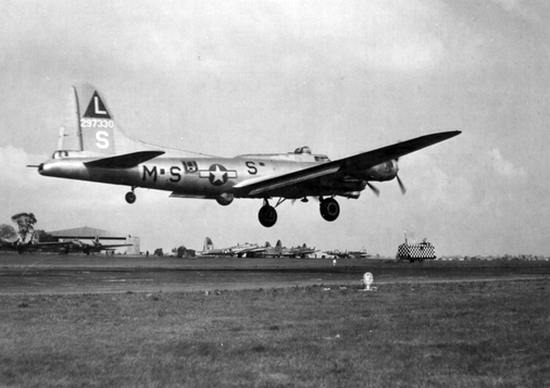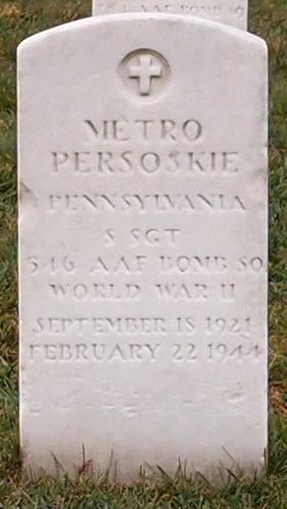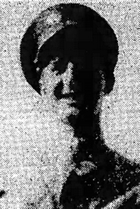Metro Persoskie
| Date and Place of Birth: | September 18, 1921 Iselin, PA |
| Date and Place of Death: | February 22, 1944 Irthlingborough, England |
| Baseball Experience: | Minor League |
| Position: | Pitcher/Outfield |
| Rank: | Staff Sergeant |
| Military Unit: | 546th Bomb Squadron, 384th Bomb Group USAAF |
| Area Served: | European Theater of Operations |
Metro Persoskie was born to Ukaranian immigrant parents, Alexander
and Mary Persoskie, in the coal-mining town of Iselin in western
Pennsylvania. The town was built at the turn of the 20th Century for the
Rochester & Pittsburgh Coal & Iron Company, and the skinny left-handed
pitcher was well-known in the local area. Despite the small size of the town, Iselin had two of its sons,
Sig Broskie and Red Tramback, playing in the minor leagues during the
1930s, and in August 1939, Persoskie - accompanied by local storekeeper
John Rosenberg, who represented himself as the youngster's manager -
traveled to Pittsburgh for a trial with the Brooklyn Dodgers.
Despite his size (5-foot-9 and 165 pounds) the Dodgers were impressed
with Persoskie's work in the bullpen and allowed him to throw batting
practice against the Brooklyn hitters. "One after another the Brooklyn
hitters came back to the bench," reported the Brooklyn Eagle, "saying
things like 'Who the heck is that kid?' . . . 'I hit that last one good
but the punk fooled me with a curve just before that' . . . 'Say, I
wonder who taught that boy to make a fastball sail' .. . 'I don't know
who he is or where he came from, but there's many a guy getting by in
this league with less stuff than he's got.'"
The Dodgers were keen to sign the youngster but when Rosenberg learned this, he tripled the amount he wanted them to pay. Angered by this, coach Charley Dressen made the 50-mile trip to Iselin to get Metro's mother to sign a deal. Dressen found Metro's mother in a weather-beaten, unpainted shack. She could neither speak nor understand English and Dressen had, first, to find an interpreter. Dressen learned that Metro's father, a miner, had died in 1932 and times were hard for the mother of six, with young Metro unable to secure a job in the coal mines and that the family's only income was the few dollars he was able to make pitching in sandlot games. Dressen gave the mother a few hundred dollars and she signed the contract for ther son to play professional baseball.
The deal, however, was not as smooth as it
should have been.
Rosenberg, the storekeeper, claimed that the
Brooklyn club had promised to pay him $250 if Persoskie signed and he
filed a suit against them when they failed to pay. In May 1941,
Rosenberg was awarded a verdict of $275.25 against the Dodgers.
Meanwhile, Persoskie returned to Brooklyn with the Dodger's and finished
the year playing semi-pro baseball for Joe Fero's Glendale Farmers. In
1940, he was initially assigned to the Dayton Wings of the Class C Middle-Atlantic
League, but was optioned to the Superior Blues of the Class D Northern
League before the season began. Persoskie had an 8-6 won-loss
record and a 3.63 earned run average in 20 games on the mound for the
Blues, and also played the outfield in 19 games for a .210 batting
average.
In 1941, Persoskie joined the Valdosta Trojans of the Class D
Georgia-Florida League. In 25 outings he had a 9-7 record and 3.82 ERA,
and moved on to the Lancaster Red Roses of the Class B Interstate League
in 1942. Persoskie made five appearances for the Red Roses before
military service called in July. He trained with the Army Air Force as
a radio operator/aerial gunner with the 806th Technical School Squadron
at Sioux Falls Army Airfield, South Dakota, and in October 1943, he was assigned to the 546th Bomb
Squadron of the 384th Bomb Group, Eighth Air Force, at Grafton-Underwood
in England. Staff Sergeant Persoskie was a waist gunner on a Boeing B-17
Flying Fortress and successfully completed 14 daytime missions against
targets over enemy-occupied Europe.
On February 22, 1944, the 384th Bomb Group's target was the Junkers
Aircraft Fuselage Plant at Aschersleben, Germany. As B-17s from various bomb groups
assembled over England, Persoskie's B-17G (#42-31516), piloted by Second Lieutenant
Sydney R. Jeter, Jr., collided with another from the 303rd Bomb Group.
The other B-17 was cut in two at the rear door position and both planes
plunged to earth. Only the navigator and bombardier of Persoskie's crew
managed to escape, while a waist gunner of the other bomber also
parachuted to safety. Seventeen airmen, including Staff Sergeant
Persoskie, were trapped inside the stricken planes and perished on
impact in the British countryside at Irthlingborough in
Northamptonshire.
Metro Persoskie was buried at Arlington National Cemetery in Fort Myer,
Virginia.
|
Year |
Team |
League |
Class |
G |
IP |
ER |
BB |
SO |
W |
L |
ERA |
| 1940 | Superior | Northern | D | 20 | 119 | 48 | 80 | 95 | 8 | 6 | 3.63 |
| 1941 | Valdosta | Georgia-Florida | D | 25 | 158 | 67 | 94 | 133 | 9 | 7 | 3.82 |
| 1942 | Lancaster | Interstate | B | 5 | 16 | - | 6 | 8 | 0 | 2 | - |
|
Team |
League |
Class |
G |
AB |
R |
H |
2B |
3B |
HR |
RBI |
AVG |
|
| 1940 | Superior | Northern | D | 50 | 105 | 10 | 22 | 5 | 0 | 0 | 7 | .210 |
| 1941 | Valdosta | Georgia-Florida | D | 45 | 113 | - | 22 | 4 | 0 | 0 | - | .195 |
| 1942 | Lancaster | Interstate | B | - | - | - | - | - | - | - | - | - |

A Boeing B-17G Flying Fortress

Metro Persoskie's grave at Arlington National Cemetery in Fort Myer, Virginia
Source
Brooklyn Eagle, August 3, 1939
Long Island Daily Press, August 19, 1939
Thanks to Bob Fulton for his invaluable help with this biography. Thanks also to Astrid van Erp for help with photos and information for this biography.
Date Added February 5, 2012 Updated July 31, 2017
Baseball's Greatest Sacrifice is associated with Baseball Almanac
Baseball's Greatest Sacrifice is proud to be sponsored by

